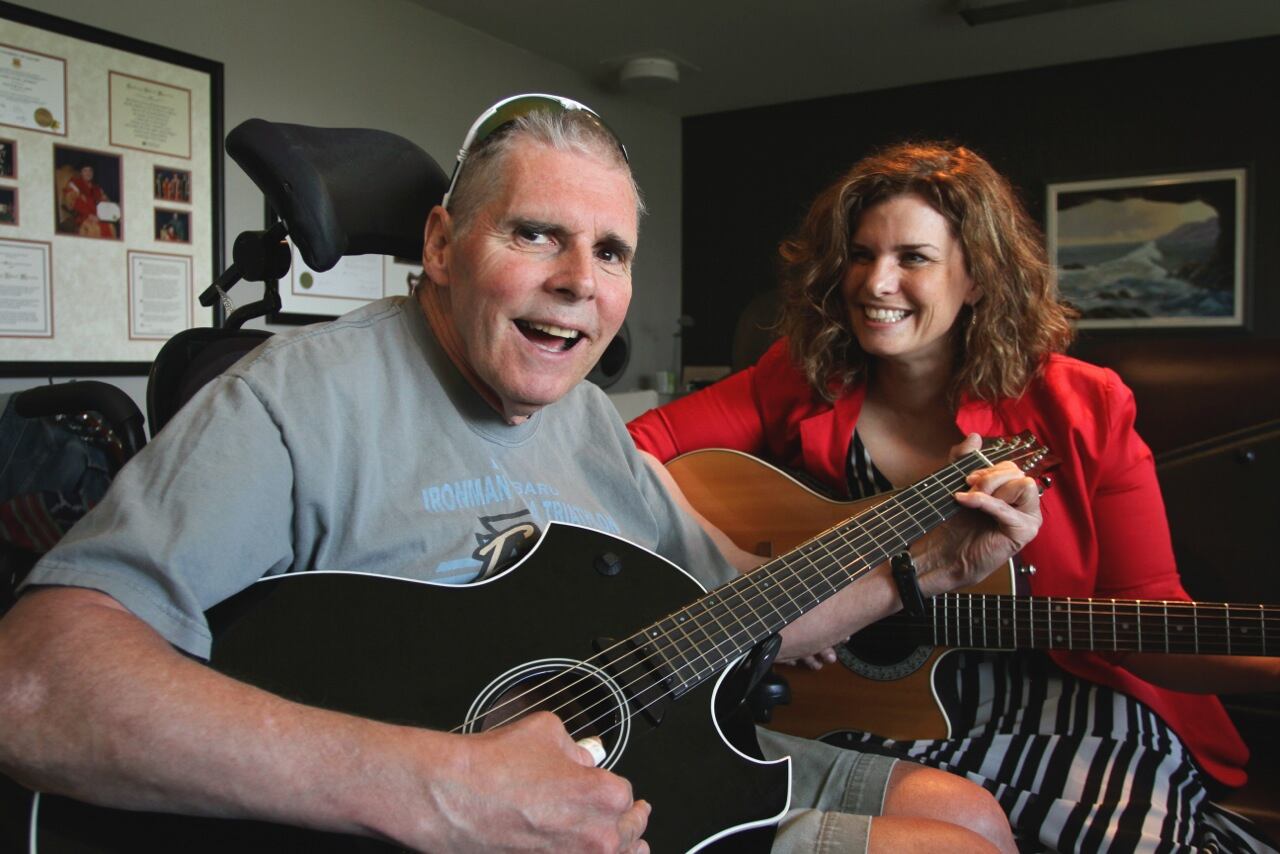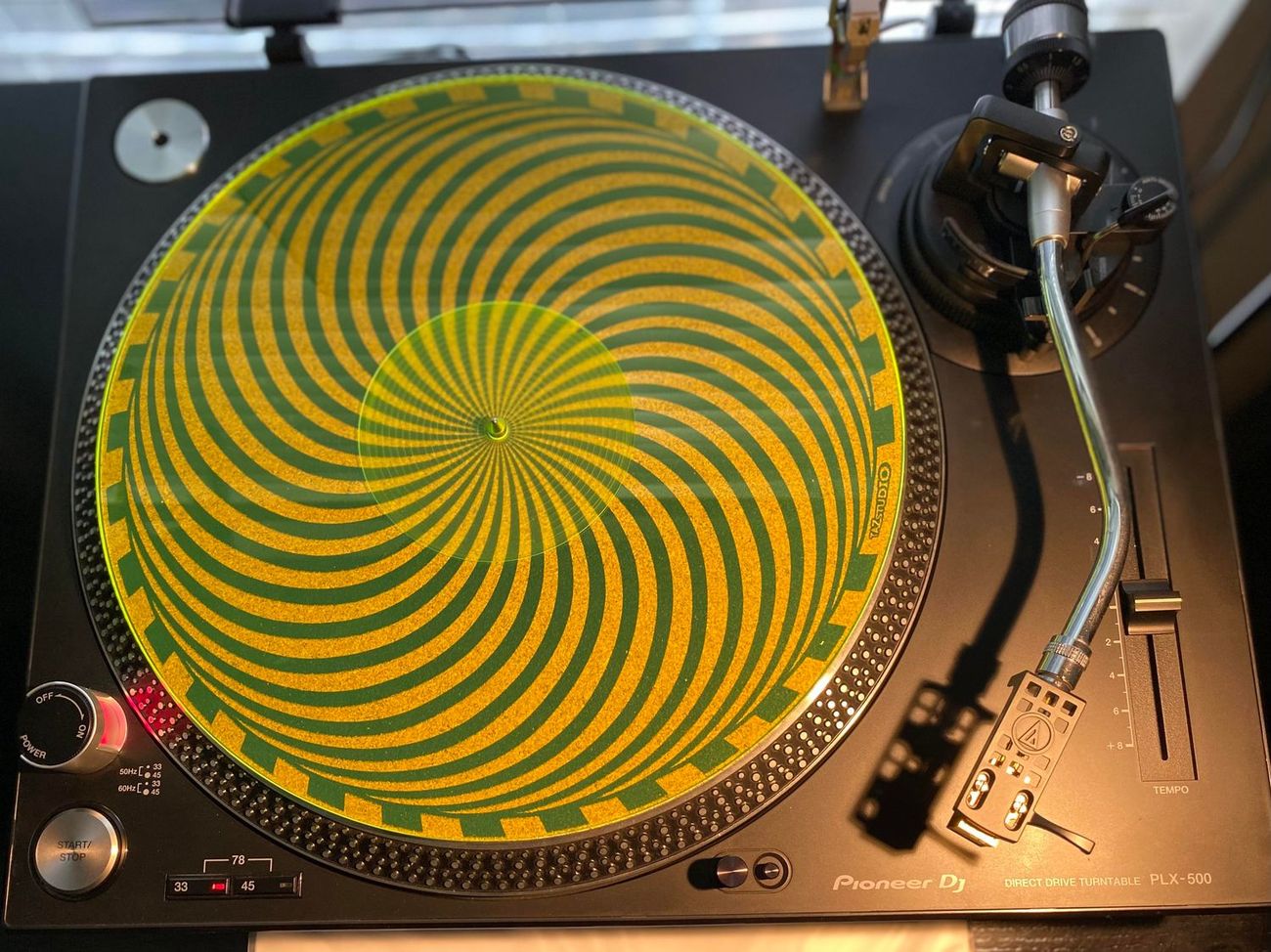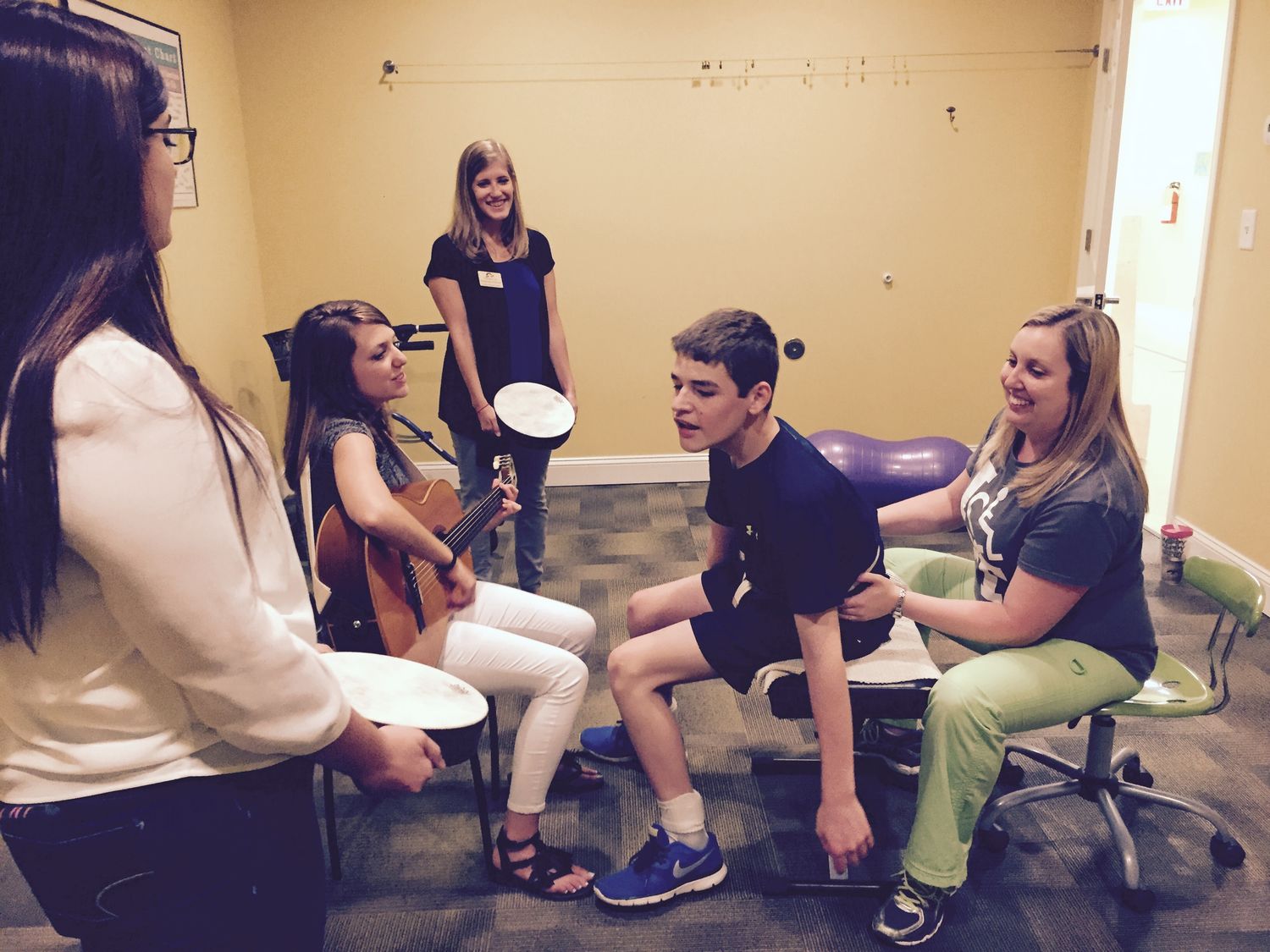Home>Events & Info>Music Therapy>How Does Music Therapy Affect The Body


Music Therapy
How Does Music Therapy Affect The Body
Published: February 1, 2024
Discover the powerful effects of music therapy on the body and mind. Explore the benefits and learn how music therapy can promote healing and well-being.
(Many of the links in this article redirect to a specific reviewed product. Your purchase of these products through affiliate links helps to generate commission for AudioLover.com, at no extra cost. Learn more)
Table of Contents
Introduction
Music has been a part of human culture for centuries, captivating our hearts and minds with its powerful and universal language. But did you know that music can also be used as a therapeutic tool to improve our physical and mental well-being? Music therapy, a field that combines the art of music with therapeutic techniques, has gained recognition for its ability to support healing and promote wellness.
Music therapy uses the power of music to address the unique needs of individuals of all ages and backgrounds. It is a holistic approach that encompasses various techniques, including listening to music, creating music, singing, and rhythmic activities. The therapeutic relationship between the music therapist and the client is at the core of music therapy, fostering a safe and supportive environment for exploration and growth.
This article will delve into the world of music therapy and explore its profound impact on the human body. We will examine the physical, psychological, emotional, cognitive, and social benefits that music therapy can provide. Whether you are experiencing physical pain, emotional distress, cognitive challenges, or simply seeking a means of self-expression, music therapy offers a unique and effective avenue for healing.
Before we dive into the many benefits, let’s take a brief look at the history and evolution of music therapy.
Definition of Music Therapy
Music therapy is a specialized branch of therapy that utilizes music as a therapeutic tool to address the physical, emotional, cognitive, and social needs of individuals. It is an evidence-based practice that is conducted by trained and certified music therapists who possess a deep understanding of both music and human psychology.
Unlike simply listening to music for enjoyment or relaxation, music therapy is a structured and intentional therapeutic process. It involves the application of music-based interventions to achieve specific therapeutic goals. These goals can vary widely depending on the needs of the individual, but may include reducing pain and anxiety, improving communication and self-expression, enhancing cognitive functioning, promoting emotional healing, and fostering social connections.
Music therapy can be employed with individuals of all ages, from infants to the elderly, and can be tailored to meet the unique needs of each person. The therapy sessions can take place in various settings, including hospitals, schools, rehabilitation centers, mental health facilities, and private practice. Music therapists are skilled in assessing the needs of their clients and designing appropriate music interventions that align with their goals.
It is important to note that music therapy is a distinct discipline that requires extensive training and education. Music therapists must complete a recognized music therapy program, which typically includes coursework in music theory, psychology, human development, research methods, and clinical practice. They also undertake supervised internships and must pass a certification exam to practice as a professional music therapist.
Music therapy is a powerful modality that taps into the innate power of music to support healing, growth, and well-being. It embraces the idea that music is a universal language that can transcend barriers and communicate complex emotions and experiences in a nonverbal and deeply profound way. Through the intentional use of music, music therapists empower individuals to harness their own strengths and abilities, facilitating personal growth and transformation.
Now that we have a clear understanding of what music therapy entails, let us explore its rich history and evolution.
History of Music Therapy
The roots of music therapy can be traced back thousands of years to ancient civilizations such as Egypt, Greece, and China. Throughout history, music has been recognized for its therapeutic properties and used in various healing practices. It was believed to have the power to restore balance, soothe the soul, and promote well-being.
However, the modern practice of music therapy as we know it today began to emerge in the late 18th century. In the 1780s, music was utilized in European hospitals to help improve the mental health of patients. It was during this time that the first documented case of music being used therapeutically was recorded by an English physician named Dr. Samuel Mathew. He observed that music had a positive impact on his patients’ mood and behavior.
Fast forward to the early 20th century, music therapy started gaining recognition as a formal therapeutic discipline. Its development as a profession was influenced by the efforts of visionary pioneers such as Eva Augustine Vescelius in the United States and Alize Menut in France. They established the first music therapy programs and paved the way for the establishment of professional organizations and educational institutions dedicated to music therapy.
During World War II, music therapy played a vital role in the rehabilitation of soldiers with physical and emotional trauma. Music was used to promote emotional expression, alleviate pain, and facilitate the recovery process. This marked a significant turning point in the acceptance and integration of music therapy into mainstream healthcare settings.
Since then, music therapy has continued to evolve and expand its reach. The development of standardized training programs, research advancements, and the establishment of professional associations, such as the American Music Therapy Association (AMTA) and the World Federation of Music Therapy (WFMT), have contributed to its growth and recognition as a legitimate therapeutic profession.
Today, music therapy is widely practiced in various settings, including hospitals, schools, nursing homes, rehabilitation centers, mental health facilities, and private practices. It is utilized to support individuals with a wide range of physical, emotional, cognitive, and social needs, including but not limited to individuals with developmental disabilities, mental health disorders, chronic pain, and neurodegenerative diseases.
The history of music therapy is a testament to its enduring power and effectiveness in enhancing human well-being. As we explore the effects of music therapy on the body, we will witness the transformative impact it can have on individuals’ lives.
The Effects of Music Therapy on the Body
Music therapy harnesses the power of music to promote healing and well-being in the body. The therapeutic use of music has a profound impact on various physiological systems, including the cardiovascular, respiratory, neurological, and immune systems. Let’s explore some of the effects that music therapy can have on the body.
1. Stress Reduction:
Listening to calming and soothing music can stimulate the release of endorphins, which are natural “feel-good” chemicals in the brain. These endorphins help reduce stress hormones like cortisol and adrenaline, leading to relaxation and a sense of calm. The rhythmic qualities of music can also synchronize with our heartbeat and breathing, promoting a state of relaxation and reducing anxiety levels.
2. Pain Management:
Music therapy has been found to be effective in reducing pain intensity and perception. It can serve as a distraction from physical discomfort and evoke positive emotions, which in turn can activate the release of natural pain-relieving chemicals in the body. Additionally, music therapy can help improve mood and emotional well-being, creating a more positive mindset towards pain management.
3. Improved Motor Function:
Rhythmic and melodic cues in music can enhance motor coordination and movement in individuals with motor disorders or neurological conditions. The structured nature of music can help stimulate and synchronize neural pathways, promoting improved motor function and coordination. This is particularly beneficial in rehabilitation settings for individuals recovering from strokes or traumatic brain injuries.
4. Enhanced Cognitive Abilities:
Engaging with music activates various areas of the brain, stimulating cognitive functioning. Music therapy has been shown to improve attention, memory, and problem-solving skills. It can also support individuals with neurodegenerative diseases, such as Alzheimer’s or Parkinson’s, by stimulating memory recall, reducing agitation, and improving overall cognitive functioning.
5. Boosted Immune System:
Research has suggested that music therapy can have a positive impact on the immune system. Listening to music can stimulate the production of antibodies and natural killer cells, enhancing the body’s ability to fight infections and diseases. It can also reduce the production of stress hormones, which can suppress immune function.
These are just a few examples of the effects that music therapy can have on the body. The power of music to influence our physiological responses is remarkable, and when utilized in a therapeutic context, it can support healing, promote well-being, and enhance the overall quality of life.
Physical Benefits of Music Therapy
Music therapy offers a myriad of physical benefits for individuals of all ages and physical conditions. Whether it’s through listening to music, engaging in rhythmic activities, or creating music, the therapeutic use of music can have a profound impact on the body.
1. Pain Management:
Music therapy can effectively alleviate pain by diverting attention from discomfort and promoting relaxation. Listening to calming music or participating in music-making activities releases endorphins, the body’s natural pain-relieving chemicals. This can be particularly beneficial for individuals dealing with chronic pain, post-operative recovery, or undergoing medical procedures.
2. Rehabilitation and Motor Skills:
For individuals recovering from physical injuries, strokes, or neurological conditions, music therapy can help improve motor function and coordination. The rhythmic cues and structured nature of music can stimulate and synchronize the neural pathways responsible for movement. Engaging in musical activities like drumming or playing instruments can also enhance fine motor skills and hand-eye coordination.
3. Cardiovascular Health:
Research has shown that listening to music can have a positive impact on cardiovascular health. It can reduce heart rate, blood pressure, and cortisol levels, promoting relaxation and stress reduction. The rhythmic qualities of music can also encourage the body to synchronize breathing and heart rate, leading to a more balanced cardiovascular system.
4. Improved Respiratory Function:
Music therapists often incorporate breathing exercises and singing techniques into their sessions. These techniques can help individuals with respiratory conditions, such as asthma or chronic obstructive pulmonary disease (COPD), improve lung function, strengthen respiratory muscles, and enhance oxygen intake. Singing can also promote deep breathing and proper diaphragmatic control.
5. Enhanced Physical Endurance:
Musical rhythms and tempo can influence physical movement and help individuals improve their endurance during exercise or rehabilitation sessions. The use of music can serve as a motivational tool, creating a rhythmical and enjoyable atmosphere that encourages individuals to push their physical limits and engage in activities for longer durations.
These physical benefits of music therapy highlight the significant impact that music can have on the body’s physical well-being. By leveraging the inherent power of music, individuals can experience improved pain management, motor skills, cardiovascular health, respiratory function, and physical endurance. Music therapy truly enhances the healing journey on a physical level.
Psychological Benefits of Music Therapy
Music therapy has profound psychological benefits, providing emotional support and promoting mental well-being. The therapeutic use of music can address a wide range of psychological needs and conditions, offering individuals a unique avenue for self-expression, exploration, and healing.
1. Emotional Expression and Regulation:
Music has the power to evoke and express a range of emotions. Music therapy allows individuals to explore and process their emotions in a safe and supportive environment. It provides an outlet for emotional expression, enabling individuals to communicate and release pent-up feelings. Engaging in music-making or listening to relevant music can help regulate emotions, reducing anxiety, stress, and depression.
2. Improving Mood and Elevation of Spirit:
Music therapy has the ability to uplift the spirit and improve mood. Listening to uplifting and joyful music can boost feelings of happiness, positivity, and motivation. The rhythm and melody of music can stimulate the brain’s reward pathways, leading to the release of dopamine, a neurotransmitter associated with pleasure and mood enhancement.
3. Enhancing Self-Awareness and Self-Esteem:
Through music therapy, individuals can gain a deeper understanding of themselves and develop a stronger sense of self. The creative process of music-making supports self-exploration, self-reflection, and self-discovery. This increases self-awareness and fosters a positive self-image, leading to improved self-esteem and self-confidence.
4. Stress Reduction and Relaxation:
Music therapy is known for its ability to reduce stress, anxiety, and tension. Calming and soothing music can slow down heart rate, lower blood pressure, and promote deep relaxation. Music therapists often use specially selected music to create a tranquil and peaceful atmosphere, facilitating a sense of calm and well-being.
5. Cognitive Stimulation and Memory Recall:
Engaging with music stimulates various cognitive processes. Musical activities, such as singing, playing instruments, or engaging in music-based games, can enhance memory, attention span, and cognitive function. For individuals with cognitive impairments or neurodegenerative diseases, music therapy is highly effective in stimulating memory recall and enhancing cognitive abilities.
These psychological benefits of music therapy highlight its transformative impact on mental well-being. By utilizing music as a therapeutic tool, individuals can experience emotional expression and regulation, improved mood, enhanced self-awareness and self-esteem, stress reduction, and cognitive stimulation. Music therapy provides a powerful path towards psychological healing and growth.
Emotional Benefits of Music Therapy
Music therapy offers a wealth of emotional benefits, providing individuals with a safe and supportive space to explore and express their emotions. Through the therapeutic use of music, individuals can experience profound emotional healing, growth, and well-being.
1. Emotional Expression and Release:
Music therapy provides a nonverbal means of emotional expression. It allows individuals to connect with and express their emotions through the music itself, whether it be through listening or actively participating in creating music. This can be particularly beneficial for those who may struggle with verbal communication or find it challenging to express their emotions in traditional ways.
2. Validation and Empathy:
Music therapists cultivate a deeply empathetic and understanding environment, where individuals feel heard, seen, and validated. The therapeutic relationship formed during music therapy sessions provides a space for individuals to share their emotions without judgment. This empathetic connection can foster a sense of validation and promote emotional healing.
3. Mood Enhancement and Elevation:
Music has the power to elicit a wide range of emotions and can be utilized to enhance mood. Listening to uplifting and joyful music can elevate spirits and promote feelings of happiness and positivity. Conversely, reflective and introspective music can help individuals process and navigate through deeper emotions, fostering a sense of emotional well-being.
4. Anxiety and Stress Reduction:
Music therapy has a calming and soothing effect on the mind and body. It can help reduce anxiety and stress levels by slowing down heart rate, lowering blood pressure, and promoting relaxation. Engaging in music-making or listening to comforting music can act as a grounding tool, providing a sense of comfort, safety, and emotional support.
5. Trauma Processing and Healing:
Music therapy can be a valuable tool in processing and healing from emotional trauma. Music can evoke memories and emotions associated with traumatic experiences, allowing individuals to explore and work through them in a controlled and supportive environment. The music therapist can guide individuals towards healing and resilience, promoting a sense of emotional well-being.
The emotional benefits of music therapy are vast and profound. By engaging with music on an emotional level, individuals can experience emotional expression and release, validation and empathy, mood enhancement, anxiety and stress reduction, and trauma processing and healing. Music therapy offers a unique and powerful pathway towards emotional well-being and healing.
Cognitive Benefits of Music Therapy
Music therapy has a profound impact on cognitive function, stimulating various areas of the brain and enhancing cognitive abilities. Through engaging with music, individuals can experience improved memory, attention, problem-solving skills, and overall cognitive well-being.
1. Memory Enhancement:
Listening to familiar music can evoke memories and facilitate memory recall. In individuals with neurological disorders or cognitive impairments, such as Alzheimer’s disease or dementia, music therapy can be a powerful tool in stimulating memory retrieval and enhancing cognitive function. The rhythm and melody of music activate neural pathways associated with memory processing, promoting improved memory recall and retention.
2. Attention and Focus:
Engaging in music therapy requires focus and attention. Playing an instrument or participating in music-based activities requires individuals to concentrate on rhythm, timing, and coordination. This can enhance attention span, concentration, and focus, which can have positive effects on other cognitive tasks and daily activities.
3. Language and Communication:
Music therapy can support language and communication development in individuals with speech or language disorders. The rhythm, melody, and structure of music can help improve speech articulation, fluency, and verbal expression. Singing or engaging in vocal exercises can strengthen vocal muscles and support clear and concise communication.
4. Cognitive Flexibility and Problem-Solving:
Musical improvisations and creative exercises in music therapy promote cognitive flexibility and problem-solving skills. The spontaneous nature of music-making challenges individuals to think on their feet, adapt to changing musical elements, and make decisions in real-time. This can enhance cognitive flexibility, creativity, and problem-solving abilities in various contexts.
5. Executive Functioning:
Music therapy can improve executive functioning skills, such as planning, organizing, and decision-making. Engaging in music-making requires individuals to follow musical cues, coordinate multiple tasks, and make sequencing decisions. These skills translate into improved executive functioning abilities in daily life activities.
The cognitive benefits of music therapy highlight the brain’s remarkable ability to respond and adapt to musical stimuli. By engaging with music in a therapeutic context, individuals can experience enhanced memory, attention, language and communication skills, cognitive flexibility, problem-solving, and executive functioning. Music therapy offers a powerful means of supporting cognitive well-being and fostering cognitive growth and development.
Social Benefits of Music Therapy
Music therapy provides numerous social benefits, fostering connection, communication, and social interaction. Through group music experiences and collaborative music-making, individuals can enhance their social skills, build relationships, and feel a sense of belonging and community.
1. Communication and Expression:
Music provides a universal language that transcends barriers and facilitates communication. In music therapy, individuals can express themselves through music, even if they struggle with verbal communication. Music therapists use various techniques, such as songwriting, improvisation, and lyric analysis, to support individuals in communicating and expressing themselves in a safe and supportive environment.
2. Building Relationships:
Group music therapy sessions provide opportunities for individuals to connect with others who share similar interests and experiences. Engaging in music-making together fosters a sense of camaraderie and social connection. Working collaboratively on musical activities builds trust, empathy, and a sense of belonging, which can lead to the formation of meaningful and supportive relationships.
3. Enhancing Social Skills:
Music therapy offers a structured and engaging platform for practicing and developing social skills. Participation in group music-making activities promotes turn-taking, active listening, following directions, and cooperation. Individuals learn to work together as a team, respect each other’s contributions, and develop essential skills for successful social interactions.
4. Self-Confidence and Empowerment:
Engaging in music therapy and experiencing successes in creating music can boost self-confidence and empower individuals. Performing music in front of others, receiving positive feedback, and participating in musical collaborations can help individuals build a sense of self-worth and belief in their abilities. This newfound confidence can extend beyond the music therapy sessions, positively impacting social interactions in other areas of life.
5. Creating a Sense of Community:
Music therapy provides a space for individuals to feel a sense of belonging and community. Group music-making activities bring people together and create a shared experience. This sense of community can have a transformative effect, offering support, validation, and a network of individuals who understand and accept one another.
The social benefits of music therapy highlight its power to bridge gaps, promote social interaction, and foster a sense of community. By engaging in music-making activities, individuals can develop and enhance their communication skills, build relationships, boost self-confidence, and experience the joy of being part of a community brought together by the universal language of music.
Conclusion
Music therapy is a powerful and effective form of therapy that utilizes the therapeutic power of music to support healing, growth, and well-being. Through the intentional use of music, music therapists address the physical, psychological, emotional, cognitive, and social needs of individuals of all ages and backgrounds.
Music therapy offers a wide range of benefits for the body, including pain management, improved motor function, cardiovascular health, enhanced respiratory function, and increased physical endurance. The therapeutic use of music can also have significant psychological benefits, such as emotional expression and regulation, mood enhancement, self-awareness, stress reduction, and trauma processing. Additionally, music therapy stimulates cognitive functioning, promoting memory enhancement, attention, language and communication skills, cognitive flexibility, problem-solving, and executive functioning.
Beyond the individual benefits, music therapy fosters social connection, communication, and relationship-building. It creates a sense of community, providing individuals with a supportive network and a space to express themselves and develop social skills.
The history and evolution of music therapy demonstrate its recognition and integration as a legitimate therapeutic profession, supported by research and professional organizations. Music therapists undergo specialized training and hold a deep understanding of both music and human psychology, enabling them to create tailored interventions to meet the unique needs of their clients.
In conclusion, music therapy is a holistic and transformative form of therapy that harnesses the innate power of music. It has the ability to heal, support growth, and enhance overall well-being on physical, psychological, emotional, cognitive, and social levels. As we continue to explore and embrace the therapeutic potential of music, we open doors to new pathways of healing and self-discovery.











